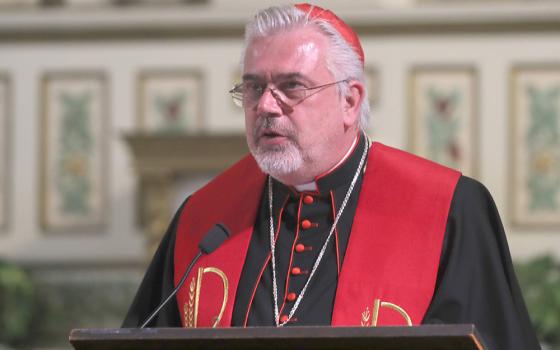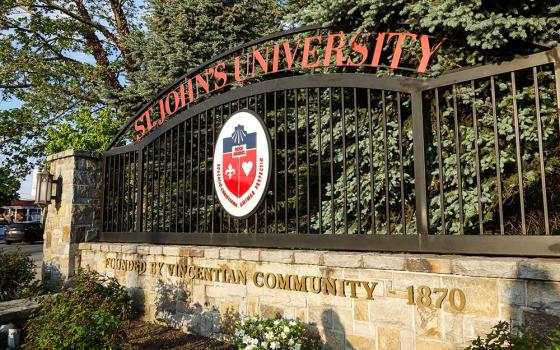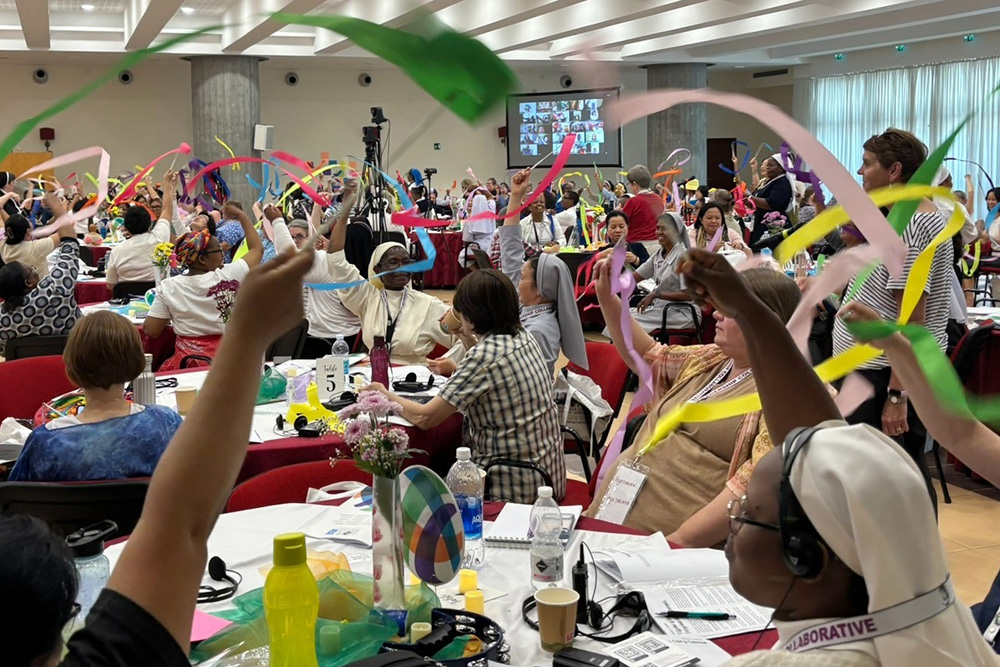
Attendees at the Hope 2025 gathering in Rome celebrate during one of the sessions. The event for sisters younger than 65 was held June 3-7 and intended to "explore our life, our future, and our gifts" as leaders and sisters, according to the event description. (Courtesy of Leadership Collaborative)
There were nearly 200 sisters gathered in Rome for the five-day event and another 100 sisters joining online. But don't call it a conference.
Hope 2025, a gathering organized by the Leadership Collaborative for Catholic sisters under the age of 65, was part retreat, part networking event, part guided prayer and part space for connection. But there were no keynote speakers, no workshops.
The Leadership Collaborative was formed in 2012 to develop leadership skills in women religious, and now has about 700 members. Hope 2025 was not meant to accomplish anything in a practical sense, but to "explore our life, our future, and our gifts" as leaders and sisters, according to the event description.
"We don't like to call it a conference," said Sr. Romina Sapinoso, associate director of the Leadership Collaborative. "It's a gathering."
Advertisement
Sapinoso, a Sister of Charity of Cincinnati, led the planning for Hope 2025, which took place June 3-7. The biggest part of the gathering, she said, was listening to each other, and finding how much sisters have in common, despite being from 149 congregations in 45 countries.
"It's helpful for each of us to listen to how other people are experiencing what is hard or difficult and what is beautiful," Sapinoso said. "The point of connecting was our connection with God."
Precious Blood Sr. Mumbi Kigutha said the idea of the event being a gathering rather than a conference was to create a space where the attendees made their own connections and discovered their own leadership ability.
"It's really a different kind of space," Kigutha said. "Our role was just to create that space, to draw that out and trigger conversations."
Adrian Dominican Sr. Xiomara Méndez-Hernández said one sister told her she was surprised there were no important speakers scheduled to present.
"This was intentional, because we are the speakers," she said. "It wasn't a conference; it was about the collective. Something new was coming out in front of us."
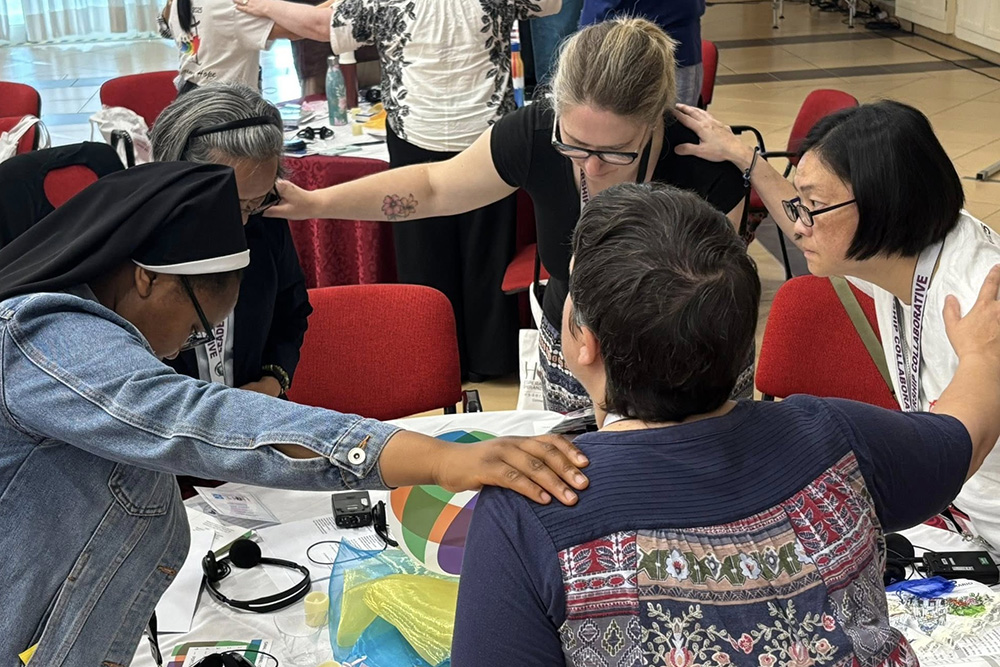
Attendees at the Hope 2025 gathering in Rome pray during one of the sessions. The event was held June 3-7 and focused on bringing younger sisters together from around the world. (Courtesy of Leadership Collaborative)
Kigutha led a session on lamenting, which she said was not meant to dwell on the negative but to confront it.
"Lamenting helps us embrace the resurrection. It gives us that time to name what is hurt within us. It gives us a way to let go," she said. "We all try to run away from pain, but it doesn't go anywhere."
That is especially important for sisters, Kigutha said.
"We fix everyone else, but we don't take time to fix ourselves. It's so easy to say, 'Oh my God, my needs are not as serious — here's a family that doesn't have a bed and hasn't eaten,' " she said. "That's why community is so important. You can tell others, 'I had a bad day. I'm suffering.' "
Now, she said, despite being from different charisms, different cultures and different continents, the sisters who took part have another community they can lean on.
"We are sharing this way of life," Kigutha said. "People have formed WhatsApp groups."
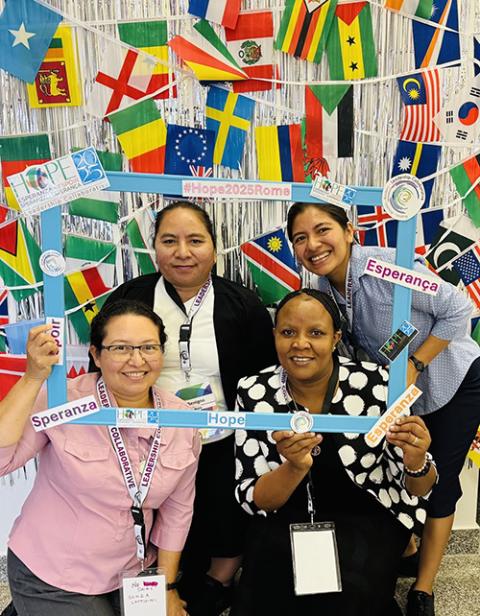
Attendees at the Hope 2025 gathering in Rome pose for a photo. Despite being from different charisms, different cultures and different continents, one attendee said, the sisters who took part have another community they can lean on. (Courtesy of Leadership Collaborative)
Méndez-Hernández said the lamentations were powerful.
"Some sisters said, 'I thought I was done with this,' but were able to recognize they're still carrying things," Méndez-Hernández said. "We went from emptying ourselves to a deeper connection with our Creator. It was a deep, deep, deep experience because we were able to recognize the pain that we have accumulated."
Many sisters suffer from secondhand trauma, she said, from seeing the pain of those they minister to. Wounds that are not dealt with fester.
"We recognize that we are wounded healers," Méndez-Hernández said. "But by recognizing our own suffering, we are more open to seeing the suffering of others."
At one point during the event, the sister leading the session asked attendees to ask themselves what they would be if their congregation didn't exist, noting that their charism, their commitment, their relationships and their way of living would all continue. Kigutha said sisters need to remember their commitment is to God's will, not an institution.
"Anything that grows big enough, you turn it into an institution so you can run things," she said. "But when you go back to the beginning, there were no institutions. A lot of founders did not start out to form a congregation."
Instead, the congregation was a tool to help them minister. But it is the ministry that matters, Kigutha said, not the tool used at that moment in time.
"Who knows what happens even 50 years from now?" she said. "The question becomes what is ours to do. And what is ours to do is grow this global sisterhood, to break down the silos that have grown up."
Attendees were asked what they would be if their congregation didn't exist, noting that their charism, their commitment, their relationships and their way of living would all continue.
Leadership Collaborative executive director Sr. Linda Buck, a Sister of St. Joseph of Orange, said taking time out to lament their struggles brought sisters together.
"We're all kind of going through the same thing," even though the circumstances may be different, Buck said. While sisters in North America may be struggling with diminishment, sisters elsewhere may be struggling with a lack of resources, or with how women are treated in their culture. "People got into it. It was beautiful. And then we moved from lament into celebration."
Méndez-Hernández said the gathering was powerful.
"It was beyond expectations," she said. "We created an oasis for us to gather in to be with one another in a deep way, so we can go out into the world and give of ourselves authentically."
This was the second Hope gathering the Leadership Collaborative has sponsored. The first was in January 2024 in Chicago, and attendees immediately said they wanted another. Organizers say a third event will be held in 18-24 months either in Africa or Latin America.





